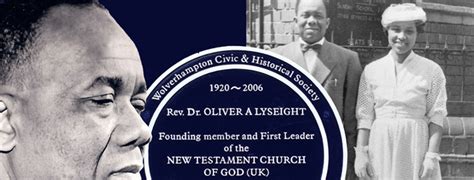May 11th: Today’s Feature
- webbworks333
- May 10, 2025
- 4 min read
Updated: May 11, 2025
May
Oliver Lyseight, born on December 11, 1919, in the district of Claremont, Hanover parish, Jamaica, was the fourth child in a large family of twelve children. Growing up, he was raised in the Methodist tradition and had a strong foundation in his faith. Throughout his school years, Oliver displayed exceptional academic abilities and had a particular affinity for subjects such as arithmetic, art, geography, and science.

Early Life
In 1935, Oliver had his first encounter with the Church of God, although he did not officially join until 1939. It was during this time that he felt a calling to ministry and decided to dedicate his life to serving others through his faith. In 1941, he began his ministry work in Jamaica, where he tirelessly worked to spread the teachings of the Church and provide support to those in need.
During World War 2, Oliver temporarily put his ministry work on hold and served as a 'War Food Administration Worker' in the United States. However, his commitment to his faith never wavered, and after the war, he returned to Jamaica to continue his ministry work. In 1946, he achieved a significant milestone in his career by becoming a Licensed Minister, further solidifying his dedication to his calling.
Family
In March 1946, Oliver had the pleasure of meeting Rose Goodison, who would later become his wife. Although they initially met in 1946, it wasn't until the following year that they began dating. On June 11, 1947, Oliver and Rose exchanged vows and embarked on a lifelong journey together. Their union was blessed with the arrival of seven children: Errol, Newton, Neville, Delrose, Ronald, Patricia, and Sharon. As a devoted husband and father, Oliver found joy in both his family life and his ministry work, striving to be a positive influence in the lives of those around him.
Britannica, Liverpool and Racism
Oliver's journey to Britain in 1951 was marked by his arrival on the ship 'Britannica' at Liverpool Docks on November 8th of that year. As one of the early African Caribbean members of the Wolverhampton community, he sought solace and connection by attending the Darlington Street Methodist Church in the town centre. Initially, Oliver did not encounter any difficulties in being part of a predominantly white church. However, this changed when a new minister assumed leadership, bringing with him a wave of racism that Oliver and others had not previously experienced.
In response to the racism they faced, Dr. Lyseight, who had also encountered similar discrimination, embarked on a mission to find a suitable place of worship. He connected with other immigrants who had shared their own stories of racism, and together they sought a solution. It became evident that a significant number of individuals had been so deeply affected by racist abuse that they had chosen to refrain from attending any church at all.
Church!
Driven by a desire to create a safe and inclusive space for themselves and others, Dr. Lyseight gathered a group of immigrants to establish their own church. Initially, they held prayer meetings in a member's home on Faulkner Street. As their numbers grew, they relocated their gatherings to the local Y.M.C.A. on Stafford Street. Eventually, the group made the decision to affiliate themselves with the New Testament Church of God, an established church with a presence in Jamaica and the USA. With an initial congregation of 25 individuals, the newly formed church began its journey.
As more migrants arrived in the region, the popularity of the New Testament church continued to soar, attracting a growing congregation. This led to the establishment of additional branches in Birmingham, London, and Walsall. Recognising the need to adapt to this expansion, the leaders of the church responded by appointing Dr. Lyseight as the National Overseer in Britain, a role bestowed upon him by the State Board of the Church in the USA. This appointment solidified his position as a leader within the church and allowed for further growth and development of the New Testament Church of God in Britain.
Legacy & Honour
Dr. Lyseight led a Gospel preaching mission across the country with his wife, Rose, and the choir she managed. During his time, the church infrastructure in Britain developed significantly, with the establishment of church districts and a national calendar. He became the first national spiritual leader for the Windrush Generation in England and Wales.
Under Dr. Lyseight's leadership, national administrative structures were established, solidifying the legal and charitable status of the Church. District and local structures were put in place, along with the appointment of solicitors, accountants, auditors, and the establishment of Bible training institutes and regional branches. Additionally, church buildings were purchased, missionaries were supported in West Africa, and ministers were trained and ordained.
Dr. Lyseight was a key figure in the establishment of the Afro West Indian United Council of Churches and played a significant role in the wider church movement's work of Ecumenism. His efforts led to the firm establishment of the church in Scotland and the Republic of Ireland. After retiring in 1978, Dr. Lyseight passed away in 2006, with a funeral service attended by approximately 2,000 people. A Blue Plaque was unveiled in Wolverhampton on September 20, 2013, honouring his service to the local Black and minority ethnic communities.
The celebration service and Commemorative Blue Plaque unveiling ceremony served as a momentous occasion to honour the legacy of Rev. Dr. Oliver A. Lyseight. As a founding member and the First Leader of the New Testament Church of God (UK), his visionary leadership and profound impact on the church and the wider community were acknowledged and celebrated. This event not only paid tribute to his remarkable achievements but also served as an inspiration for future generations to continue his legacy of service and devotion.



















